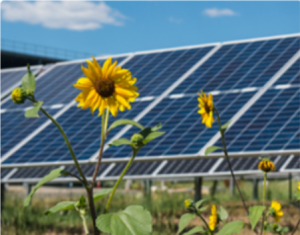Situation: The U.S. is undergoing a rapid energy transformation to clean renewable energy as a major strategy to mitigate climate change. Rural communities in Wisconsin, which are well suited for large-scale solar or wind development, may experience major economic, environment, and social transitions when a large-scale electric power facility comes to town.
With any major transition, community members ideally are actively engaged in land use, economic, and energy related decision-making. Community engagement processes assure that community members receive timely and accurate information and have avenues to voice their hopes and concerns. Yet there are situations, large-scale solar development being one of them, where residents and local government officials actually have little power to determine the trajectory of a development. In these cases, community engagement is important to assure that community concerns are addressed and to dispel misunderstandings or assumptions about the development. Even where communities lack control, there are often strategies available to assure communities reap some benefits from land use developments. More importantly, engaging the community early in a process can reduce community discord.
A team of Extension specialists and educators including Sharon Lezberg, Dane County Community Development Educator, formed to explore ways Extension can support local communities experiencing these transitions. The Portage County Executive invited the team to develop an engagement process for the towns of Grant and Plover, where large-scale solar development had already been proposed.

Response: The Extension Team designed a process to include Portage County residents in discussions about the large-scale solar developments. To first learn about the specifics of this unique place, the team convened a local advisory group to guide the process. Preliminary research included key informant interviews and stakeholder focus groups. Through the focus groups, the team gained a sense of opportunities and challenges associated with the proposed solar projects.
The project team then organized two community-wide conversations to provide information to residents and to learn more about residents’ hopes and concerns. These events included educational presentations, a Q&A session, and facilitated table discussions. The process was designed to be inclusive of multiple stakeholders in the communities, recognizing there are differing interests in communities, and striving to honor the multitude of voices. All comments were recorded and later presented in a detailed written report, which was shared with Portage County and Town officials, focus group participants, and community meeting participants. The report includes leverage points for community elected officials, landowners, and residents when dealing with solar developers. The team also produced a guidebook for Extension Educators on how to organize community engagement processes for large-scale energy development.
View the full report: Community Centered Solar Development Engagement Project
Results: The project helped Portage County officials gain a better understanding of issues for those supporting or opposing large scale solar development. Public officials also gained an understanding of how projects can and cannot be influenced. The Vista Sands project proposal was submitted for review by the WI Public Service Commission (PSC) while the Extension study was underway. Due to increased awareness from the focus groups and community conversations, more residents submitted comments to the PSC. This informed PSC and the DNR and influenced their recommendations to the developer (many of the recommendations were in regard to the impact of the solar facility on the endangered prairie chicken that reside adjacent to the targeted lands at the Buena Vista Natural Areas preserve). The Portage County final report was submitted to the County’s Extension, Agriculture and Natural Resources oversight committee. The committee recommended the findings be presented to the WI Towns Assn, as well as the Portage County Towns Assn. The Extension team is developing a presentation to be delivered throughout the state to towns’ associations, so officials are better informed and prepared for large scale solar development.
Evidence: Evaluation of the process indicated residents appreciated the opportunity to learn about the specifics of large-scale solar development and to be engaged in conversations regarding their concerns. Participants shared they would have liked to receive information about solar development prior to finding out that a large-scale project was coming to their community.
As one participant stated “Solar development is a very complex planning issue and involves stakeholders from all parts of the community. Great caution is necessary for these projects, as well as consistent community communication.”

